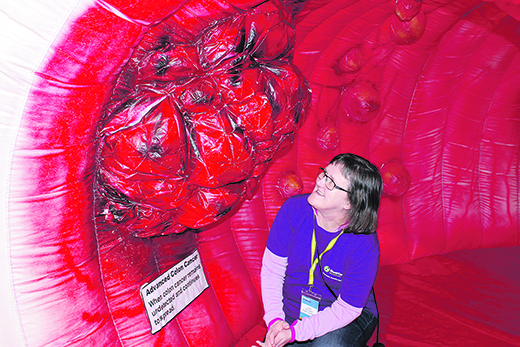It may not be the birthday present seniors want to receive, but a bowel cancer screening kit could mean they get to enjoy many more birthdays, says Aileen McGowan, business manager endoscopy improvement and bowel screening at Waikato Hospital.
Aileen is pleased the government has announced a free National Bowel Screening Programme which will be rolled out progressively across all district health boards starting in July 2017.
The free programme will offer bowel screening every two years to eligible people aged 60-74 years.
That’s nasty – Aileen McGowan inside the huge inflatable bowel with its representation of advanced colon cancer at the Fieldays Rural Health Hub.
“As the screening programme is rolled out, eventually everyone in this age group will receive, on their birthdays, a screening kit plus instruction on how to use it in the mail.
“It’s a very simple process which could save lives through early detection of bowel cancer,” says Aileen, who was one of many health professionals at the Rural Health Hub at Fieldays.
Included in the hub was a giant inflatable ‘bowel’ large enough for people to walk through.
The oversized exhibit, provided by Bowel Cancer New Zealand, was designed to be educational and fun, as well as providing important health information for the public.
“Farmers don’t always have the opportunity to get off the farm and have their health checks,” says Lee Picken, NZ National Fieldays Society’s head of events. “It’s really important to have this at Fieldays – it’s a great platform for health professionals to start that conversation.”
Mobile Health and its mobile surgical bus was also a feature of the site.
Rural Health Alliance Aotearoa New Zealand CEO Michelle Thompson says rural people are losing out when it comes to health. “Of the scant data that exists, we know that the health outcomes for rural people are poorer than for urban people. Agriculture, along with tourism, is the power base of the NZ economy. It makes good economic sense for the government to focus on the people supporting the rural economy.”
Michelle estimates there were approximately 600,000 people living rurally from Cape Reinga to Bluff. “If it were a city that would be New Zealand’s second largest city, and it doesn’t feel like the rural sector gets that level of attention when it comes to health.”
Poor access to healthcare or delay in seeking treatment can impact many medical conditions which become more serious than if they were treated earlier. Michelle says the barriers to good health are varied. They include lack of GPs and aged-care workers in some rural areas, limited access to healthcare screenings or treatment due to geographic isolation, embarrassment or difficulty talking about symptoms, and work pressures (it can be hard to ‘take time’ away from the farm, especially during busy seasons or if short-staffed).
“We want all rural people to be healthy and well, and the best way to do this is to make sure they have equitable access to health services.”



0 Comments
Leave a Comment